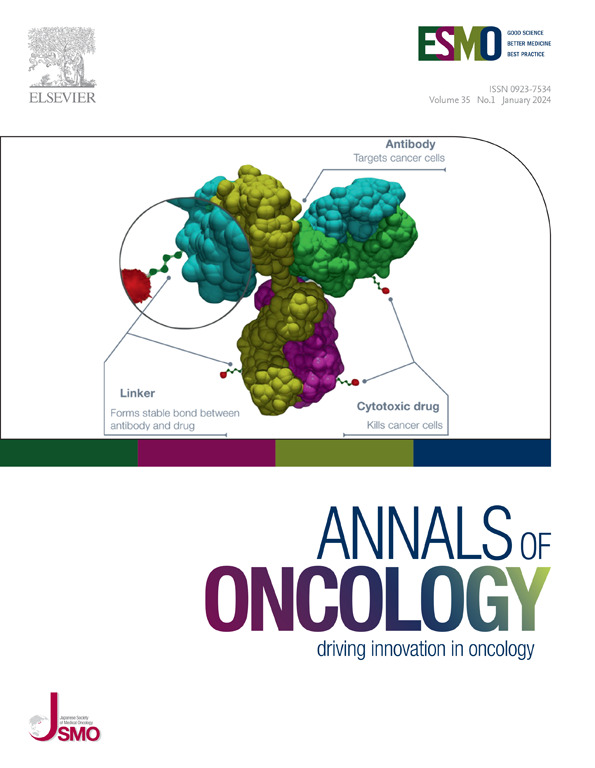在 CAPRI 2-GOIM 试验中,通过液体活检对 RAS/BRAFV600E 野生型转移性结直肠癌患者进行全面基因组分析,捕捉肿瘤异质性并确定癌症易感性。
IF 56.7
1区 医学
Q1 ONCOLOGY
引用次数: 0
摘要
背景:越来越多的证据支持对转移性结直肠癌(mCRC)进行基于肿瘤组织的综合基因组分析(CGP)。基于液体活检的循环肿瘤 DNA (ctDNA) CGP 数据很少,而且主要是回顾性的。目前还没有这两种检测方法的前瞻性比较:CAPRI 2-GOIM试验调查了当地实验室确定的RAS/BRAFV600E野生型(WT)mCRC患者在ctDNA驱动下基于西妥昔单抗的三线治疗序列的疗效和安全性。在一线治疗前,用FoundationOne(F1)CDx和F1 Liquid(F1L)CDx(324个基因)分别对肿瘤组织DNA和血浆ctDNA进行CGP检测:结果:2/207(0.96%)例患者的F1L CDx未检测到ctDNA。140/205(68.3%)名患者中没有肿瘤分数(TF)低于1%的患者,而检测到ctDNA升高(TF≥10%)。共发现 1013 个基因组变异。F1L CDx在19名患者中发现了KRAS、NRAS或BRAFV600E变异,这些患者的肿瘤被当地实验室归类为RAS/BRAFV600E WT。164/205 例(80%)患者的 F1 CDx 和 F1L CDx 均可用。两种检测结果的一致性为 61.4%。TF≥10% 的 F1L CDx 的一致性提高到 72.7%。在137/164(83%)例患者中发现了可能与抗表皮生长因子受体(EGFR)耐药性有关的基因的一致性,在TF≥10%的F1L CDx中,一致性增至91.5%。与 F1 CDx 相比,F1L CDx 检测到的基因组改变更多,其中包括 6 例 KRAS 和 NRAS 改变。总体而言,根据ESMO分子靶点临床可操作性量表(ESCAT),109/205例(53.2%)患者至少出现了一种可操作的基因组改变(I至IIIB):结论:基于基线液体活检的CGP是可行的,它与基于肿瘤组织的CGP具有很高的一致性,能更好地再现肿瘤的异质性,而且它能在约半数的RAS/BRAFV600E WT mCRC患者中发现额外的可操作基因组改变,具有临床参考价值。本文章由计算机程序翻译,如有差异,请以英文原文为准。
Comprehensive genomic profiling by liquid biopsy captures tumor heterogeneity and identifies cancer vulnerabilities in patients with RAS/BRAFV600E wild-type metastatic colorectal cancer in the CAPRI 2-GOIM trial
Background
Emerging evidence supports tumor tissue-based comprehensive genomic profiling (CGP) in metastatic colorectal cancer (mCRC). Data on liquid biopsy-based circulating tumor DNA (ctDNA) CGP are scarce and mainly retrospective. Prospective comparison between the two tests is not currently available.
Materials and methods
The CAPRI 2-GOIM trial investigates efficacy and safety of ctDNA-driven, cetuximab-based sequence of three treatment lines in patients with RAS/BRAFV600E wild-type (WT) mCRC, as determined by the local laboratory. Before first-line therapy, CGP is carried out with FoundationOne (F1) CDx and F1 Liquid (F1L) CDx (324 genes) on tumor tissue DNA and plasma ctDNA, respectively.
Results
For 2/207 (0.96%) patients, no ctDNA was detected by F1L CDx. No patient displayed tumor fraction (TF) below 1%, whereas elevated ctDNA (TF ≥ 10%) was detected among 140/205 (68.3%) patients. One thousand and thirteen genomic variants were identified. F1L CDx found KRAS, NRAS, or BRAFV600E alterations in 19 patients, whose tumors were classified as RAS/BRAFV600E WT by the local laboratory. Both F1 CDx and F1L CDx were available for 164/205 (80%) patients. A concordance of 61.4% between the two tests was observed. The concordance increased to 72.7% for F1L CDx with TF ≥ 10%. Concordance for genes potentially involved in anti-epidermal growth factor receptor resistance was found in 137/164 (83%) patients, increasing to 91.5% for F1L CDx with TF ≥ 10%. A higher number of genomic alterations was detected by F1L CDx compared with F1 CDx, including six cases with KRAS and NRAS alterations. Overall, 109/205 (53.2%) patients displayed at least one actionable genomic alteration (I to IIIB), according to the European Society for Medical Oncology Scale for Clinical Actionability of Molecular Targets (ESCAT).
Conclusion
Baseline liquid biopsy-based CGP is feasible, has high concordance with tumor tissue-based CGP, could better recapitulate tumor heterogeneity, and is clinically informative by identifying additional actionable genomic alterations in approximately half of RAS/BRAFV600E WT mCRC patients.
求助全文
通过发布文献求助,成功后即可免费获取论文全文。
去求助
来源期刊

Annals of Oncology
医学-肿瘤学
CiteScore
63.90
自引率
1.00%
发文量
3712
审稿时长
2-3 weeks
期刊介绍:
Annals of Oncology, the official journal of the European Society for Medical Oncology and the Japanese Society of Medical Oncology, offers rapid and efficient peer-reviewed publications on innovative cancer treatments and translational research in oncology and precision medicine.
The journal primarily focuses on areas such as systemic anticancer therapy, with a specific emphasis on molecular targeted agents and new immune therapies. We also welcome randomized trials, including negative results, as well as top-level guidelines. Additionally, we encourage submissions in emerging fields that are crucial to personalized medicine, such as molecular pathology, bioinformatics, modern statistics, and biotechnologies. Manuscripts related to radiotherapy, surgery, and pediatrics will be considered if they demonstrate a clear interaction with any of the aforementioned fields or if they present groundbreaking findings.
Our international editorial board comprises renowned experts who are leaders in their respective fields. Through Annals of Oncology, we strive to provide the most effective communication on the dynamic and ever-evolving global oncology landscape.
 求助内容:
求助内容: 应助结果提醒方式:
应助结果提醒方式:


